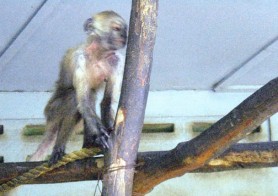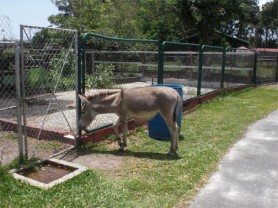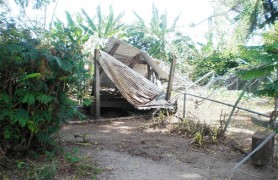-Luncheon
The National Parks Commission (NPC) board is solely accountable for all the administrative, health and safety issues at Zoological Park, Head of the Presidential Secretariat Dr Roger Luncheon has said, in wake of concerns about the management of the facility.

Luncheon, at a post-cabinet briefing last week, explained that while Office of the President (OP) is the budgetary agency responsible for NPC’s expenditure, it has nothing to do with policy-making. Policy-making for the zoo, he said, is done by NPC’s board.
Last month, Stabroek News reported on the animal housing conditions and poor health and safety practices at the zoo and a former senior manager has blamed the situation on a combination of poor decisions by NPC and inadequate funding. While Luncheon admitted that he is not conversant with NPC board recommendations– which are forwarded to OP for approval before funds are released–he said that these had been submitted in the latter part of 2009, in preparation for this year’s budget. NPC’s 2010 budget, Luncheon suggested, could have designated improvements in the zoo’s landscape and the conditions under which the animals are being kept. “All I can say is that the budget for the NPC has provided for whatever interventions the board put to the OP for it’s inclusion in their 2010 budget,” Luncheon added. Following the concerns raised about the zoo’s condition over the past weeks, Luncheon was asked if anything is being done to address the situation. “Honestly, I couldn’t answer this,” he said.

NPC General Manager Yolanda Vasconcellos on Friday said she is willing to speak about the issues raised. Vasconcellos, who has dubbed the reports on the state of the zoo “erroneous,” noted that she has to first consult the Chairman of the NPC Board. She requested that the newspaper contact her again on Monday. This is the second time Vasconcellos has promised the newspaper an interview regarding the zoo.
The zoo lacks adequate security and as a result visitors are often left unattended and can be seen interacting with some of the animals. These practices can contribute to humans being infected with diseases from animals. Zookeepers also said they are given limited safety gear to work with and their hours and conditions of work are atrocious. A management report done nearly ten years ago recommended a menu of health and safety measures for the Georgetown Zoo but it has still not been addressed by the NPC.
“No health and safety systems in place,” said the report by then manager of the Guyana Zoo, Peter Khatoo. The report recommended that: life and accident insurance policies needed to be taken out for zoo employees; a proper First Aid Kit put in place; protective clothing like goggles, safety gloves, rain gear and helmets be made available for employees; and that staff be medically examined annually.

During a visit last Friday, the zoo’s two donkeys were grazing in the compound. While fallen branches and dried vines had been removed from cages, there did not appear to be any other changes. Workers are still working under the same conditions and animals are still being kept and fed in the same cages. There is one cage towards the rear of the compound where the shed and fence was damaged by a fallen branch. The branch has been removed but the repairs are yet to be done.
The lack of health and safety practices was also still evident. A monkey that looked underfed and possibly sick was seen moving freely among the others. A former zoo volunteer, who requested anonymity, said that an animal’s physical condition is usually a good indicator that they may be ill. The former volunteer, who has had extensive training in animal health, said sick animals should be removed from among the others and returned only after they have fully-recovered. “Even if that monkey isn’t sick and it is just malnourished then it should still be removed…it will be the weakest among its kind and can be taken advantage of,” the former volunteer explained.
Meanwhile, Stabroek News also learnt that the zoo’s volunteer programme is not as vibrant as it was just five years ago. The volunteer programme was organised by a coordinator from a Canadian zoo. In the early 2000s, the programme saw many persons volunteering every August. However, there has since been a decline in the numbers.
The programme, the former volunteer explained, is usually funded by the NPC. However, it began slowly disintegrating when the Canadian coordinator left and the NPC suggested that the programme become an independent organisation.





